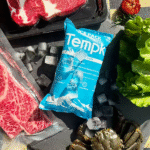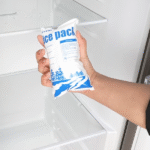Cold Chain Logistics Singapore: Key Trends and Insights for 2025
Introduction:
Cold chain logistics in Singapore is a crucial part of the global supply chain, especially for industries like pharmaceuticals, food, and biotechnology. As we move into 2025, technological advancements, stricter regulations, and an increasing focus on sustainability are shaping the landscape of cold chain logistics. In this article, we’ll explore the latest trends and best practices that are revolutionizing logistics in Singapore.

What Are the Key Trends in Cold Chain Logistics in Singapore for 2025?
-
Advancements in Temperature-Controlled Transportation
-
Blockchain and Data Transparency
-
AI and Automation in Cold Chain Management
-
Sustainability in Cold Chain Logistics
-
Regulatory Compliance and Certifications
How Is Temperature-Controlled Transportation Evolving in Singapore?
Temperature-controlled transportation is a vital element in cold chain logistics. In Singapore, a hub for trade and transportation in Southeast Asia, ensuring the safe and efficient transport of temperature-sensitive goods is paramount. The advancements in refrigeration technologies and real-time monitoring are key to maintaining product integrity during transit.
Innovations in Refrigeration Technologies
In 2025, cold chain logistics in Singapore is heavily influenced by cutting-edge refrigeration technologies. From refrigerated containers to portable cooling systems, these solutions ensure that products like vaccines, fresh food, and pharmaceuticals remain within required temperature ranges. Technologies such as advanced insulation, solar-powered refrigeration units, and hybrid cooling systems are becoming more common, offering energy-efficient and reliable options for transport.
Why This Matters for Your Business
For businesses in Singapore involved in cold chain logistics, the ability to ensure that goods stay within the optimal temperature range during transport reduces the risk of spoilage, contamination, and loss. This not only ensures compliance with regulations but also improves customer trust and satisfaction.
| Transportation Technologies | Benefits | Impact on Business |
|---|---|---|
| Solar-powered Refrigeration | Sustainable, reduces energy costs | Reduces operational expenses and environmental impact |
| Hybrid Cooling Systems | Efficient, reliable cooling | Ensures product integrity and on-time delivery |
| Real-Time Temperature Monitoring | Immediate alerts for deviations | Minimizes risk of spoilage and loss of goods |
How Is Blockchain Transforming Cold Chain Logistics in Singapore?
Blockchain technology is increasing its presence in cold chain logistics for its ability to provide transparency and security. In 2025, the need for secure, tamper-proof records of product journeys is more critical than ever, especially for biologics and pharmaceuticals. Singapore, as a global logistics hub, is adopting blockchain to enhance traceability, verify product authenticity, and ensure compliance with international regulations.
Blockchain for Transparency and Accountability
Blockchain enables end-to-end traceability, meaning that every movement of goods is recorded in an immutable ledger. This technology ensures that stakeholders can access accurate data about the temperature, location, and condition of shipments in real time. In Singapore, companies are implementing blockchain to ensure that products, especially those in the healthcare and food sectors, remain secure and compliant.
How This Enhances Your Operations
By adopting blockchain, cold chain logistics providers can enhance operational efficiency, reduce fraud, and increase accountability. It also helps in meeting regulatory requirements, particularly those related to compliance with the Good Distribution Practices (GDP) for pharmaceuticals.
| Blockchain Solutions | Benefits | Impact on Business |
|---|---|---|
| End-to-End Traceability | Secure and transparent tracking | Reduces fraud, ensures product authenticity |
| Immutable Records | Tamper-proof data | Builds customer trust and meets regulatory standards |
| Real-Time Access to Data | Instant updates | Enhances operational efficiency and decision-making |
How Are AI and Automation Impacting Cold Chain Management in Singapore?
AI and automation are shaping the future of cold chain logistics. In Singapore, businesses are increasingly leveraging AI to optimize routes, forecast demand, and improve warehouse management. AI-powered systems in cold storage facilities help maintain consistent temperature conditions and reduce energy consumption.
Automation in Cold Storage Facilities
Automation in warehouses is another key trend. In 2025, AI-driven robots are handling tasks such as inventory management, packaging, and temperature regulation. Automated systems allow for real-time monitoring and control of environmental conditions, ensuring that biologics and perishable goods are stored at optimal temperatures.
Practical Benefits for Your Business
By embracing AI and automation, your cold chain operations can become more efficient, reducing manual labor costs, minimizing human error, and improving the overall reliability of your logistics operations. The use of AI-driven analytics can predict potential issues, enabling businesses to take preventive measures before problems occur.
| AI and Automation | Benefits | Impact on Business |
|---|---|---|
| AI-powered Logistics | Optimized routes, real-time adjustments | Reduces operational costs and improves delivery times |
| Automated Warehouses | Efficient temperature management | Increases productivity and reduces human error |
| Predictive Analytics | Forecasts demand and potential disruptions | Enhances inventory management and reduces stock-outs |
Why Is Sustainability Important in Cold Chain Logistics in Singapore?
Sustainability is becoming a significant factor in cold chain logistics, particularly in Singapore, where environmental regulations are tightening. As the logistics industry faces increasing pressure to reduce its carbon footprint, cold chain providers are adopting eco-friendly practices, such as energy-efficient refrigeration and sustainable packaging materials.
Green Refrigeration and Energy-Efficient Practices
The growing demand for sustainable practices in logistics is pushing providers to invest in energy-efficient refrigeration technologies and solar-powered cold storage solutions. These initiatives reduce energy consumption and help companies comply with environmental regulations while also benefiting from lower operational costs.
Why Sustainability Matters for Your Business
Sustainability practices in cold chain logistics not only help you reduce environmental impact but also appeal to environmentally conscious consumers and businesses. By adopting green practices, you improve your company’s corporate social responsibility (CSR) profile and attract customers who prioritize sustainability.
| Sustainable Practices | Benefits | Impact on Business |
|---|---|---|
| Solar-powered Cold Storage | Reduced energy consumption | Cost savings and improved environmental compliance |
| Energy-efficient Refrigeration | Lower carbon footprint | Enhanced brand image and customer loyalty |
| Eco-friendly Packaging | Reduced plastic waste | Meets customer demands for sustainable practices |
What Are the Regulatory Compliance Requirements for Cold Chain Logistics in Singapore?
Compliance with regulations is crucial for cold chain logistics providers in Singapore. In 2025, regulations surrounding the storage and transport of temperature-sensitive goods, especially pharmaceuticals and food products, are stricter than ever. Cold chain providers must adhere to local and international regulations, including Good Distribution Practice (GDP) and Good Manufacturing Practice (GMP).
Compliance with GDP and GMP Regulations
In Singapore, businesses involved in the transport of biologics, vaccines, and other sensitive products must comply with GDP and GMP standards. These regulations require that cold chain providers maintain proper temperature control, use certified equipment, and ensure that products are handled by trained personnel throughout the supply chain.
Why Compliance Is Critical for Your Business
Regulatory compliance ensures that your business avoids penalties, product recalls, and damage to reputation. It also ensures that your products meet international standards, which is crucial for building trust with customers and regulatory bodies.
| Compliance Requirements | Benefits | Impact on Business |
|---|---|---|
| Good Distribution Practice (GDP) | Ensures product integrity | Prevents product recalls and legal issues |
| Good Manufacturing Practice (GMP) | Guarantees quality control | Builds trust with stakeholders and regulatory bodies |
| Certified Cold Chain Equipment | Meets international standards | Reduces risks of non-compliance and legal liabilities |
2025 Trends in Cold Chain Logistics in Singapore
Cold chain logistics in Singapore is evolving rapidly in 2025. With the rise of AI, blockchain, and sustainability efforts, the logistics landscape is undergoing significant transformation. Here are some of the key trends shaping the future of cold chain logistics in Singapore:
-
AI and Automation in Logistics: More companies are adopting AI-driven systems to optimize routes, automate warehouses, and predict issues before they arise.
-
Sustainability: Solar-powered refrigeration and energy-efficient solutions are becoming standard in the industry.
-
Regulatory Compliance: Stricter regulations on temperature control and product safety are pushing providers to adopt more advanced monitoring and storage systems.
Market Insights
The demand for cold chain logistics providers in Singapore continues to grow, especially in the pharmaceutical and food sectors. With the rise of sustainability efforts and technological advancements, the future looks promising for businesses that stay ahead of the curve.
FAQ
What is the role of temperature-controlled transportation in cold chain logistics?
Temperature-controlled transportation ensures that temperature-sensitive goods, such as food and pharmaceuticals, are transported within the required temperature range, maintaining their quality and safety.
How do blockchain and AI improve cold chain logistics in Singapore?
Blockchain provides transparent and secure tracking of products, while AI optimizes logistics routes, predicts disruptions, and automates warehouse management.
Conclusion and Actionable Insights
As cold chain logistics in Singapore continues to evolve in 2025, businesses must embrace technological innovations, sustainability practices, and regulatory compliance to stay competitive. By leveraging AI, blockchain, and eco-friendly solutions, you can improve efficiency, reduce costs, and build trust with customers.
Next Steps:
-
Invest in advanced temperature monitoring systems to ensure product integrity.
-
Adopt AI and automation tools to optimize logistics operations.
-
Implement sustainability practices in your cold chain logistics processes.
About Tempk
At Tempk, we specialize in providing innovative cold chain logistics solutions. With cutting-edge technology, regulatory expertise, and a focus on sustainability, we ensure your temperature-sensitive products are safely transported and stored. Contact us today to learn how we can help optimize your cold chain logistics.
Contact Us Today for a consultation on how our solutions can meet your business needs.























